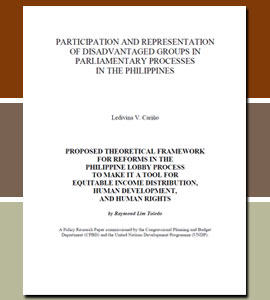Participation and Representation of Disadvantaged Groups in Parliamentary Processes in The Philippines

If democracy is indeed the government of, by and for the people, the voice of the majority who are poor, underserved and otherwise disadvantaged should be the dominant voice in society. However, most countries are still saddled with an unequal economic structure that privileges those who already have power and wealth not only in business and industry but also in affairs of the State. Nevertheless, believing that democratic governance is a work in progress, many members of the disadvantaged sectors have taken that idea seriously and have undertaken to have their views heard in the corridors of power. At the same time, the State, and individual political leaders have also opened avenues for their participation and representation in the parliamentary and other decision making processes. These efforts on both sides can go a long way towards making democracy realizable as the rule of the people.
View Documents in PDF:
Chapter I: Disadvantaged Groups and the Philippine Congress
Chapter II: The Points of Access to the Legislature
Chapter III: On the Wings of the People Power Revolution: Cases of Intervention of Disadvantaged Groups in the Eight Congress
Chapter IV: Legislating the Social Reform Agenda: Case of Intervention of Disadvantaged Groups in the Tenth CongressChapter V: Beyond the SRA: Cases of Intervention of Disadvantaged Groups in the Tenth Congress and After
Chapter VI: The Disadvantaged Groups and Congress: Synthesis and Recommendations
Bibliography
